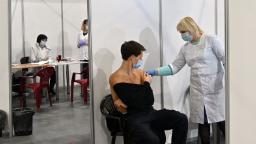
(CNN)Global health officials have warned that Ukraine will see a surge in Covid-19 cases linked to the Russian invasion, but doctors are also worried about a rise in other infectious diseases: polio, cholera and measles.
Before the war, Ukraine had low vaccination rates against these diseases, Kate White, MSF’s emergency program director, told CNN on Tuesday.
Now doctors on the ground in Ukraine fear a surge in these vaccine-preventable infectious diseases will be another consequence of the Russian invasion — and that more lives could be lost to the spread of disease.
“In terms of what we call vaccine-preventable diseases, the status in Ukraine was that the population was not vaccinated to the extent that you would get herd immunity like in many other European countries or in the US,” he said White.
Not only have immunizations been low, the administration of routine vaccinations “no longer works” because the country’s health care system has been “disrupted.”
“On top of that you have the general health situation – so many cities where access to health care is compromised, some places where they don’t have the water supply they used to have, they don’t have electricity, there are problems with sanitation — so all these risk factors are stacked on top of each other, which means there’s an increased risk,” White said, referring to diseases like cholera that usually spread in places with inadequate water treatment. poor sanitation and inadequate hygiene. Meanwhile, the risk of polio and measles rises as more people gather and flee the area while medical supplies dwindle.
Ukraine has already experienced outbreaks of these diseases.
“Last year there was an outbreak of polio in Ukraine,” White said. “Ukraine was the last country in Europe to have an outbreak of cholera in 2011, and that was in Mariupol.”
Even today, the city of Mariupol is the scene of heavy Russian attacks and damage.
Conditions in Mariupol are “unbearable” and “just plain hell,” residents who fled the besieged city in southeast Ukraine told CNN as drone footage and satellite photos emerged showing the utter devastation caused by the Russian bombardment.
As many as 2,500 civilians have died in Mariupol, Ukrainian officials estimate. About 350,000 people are trapped in the city, and officials warn those who remain are without electricity, water and heat.
“We are only at the beginning of the burden”
Growing concerns about a surge in infectious diseases come as a number of hospitals and healthcare facilities in Ukraine are no longer functioning — or have been attacked or besieged.
On Tuesday, a Ukrainian official accused Russian troops of holding people captive at a hospital in Mariupol. Pavlo Kyrylenko, the head of the Donetsk regional administration, said doctors and patients were being held against their will at the Mariupol Regional Intensive Care Hospital, also known as Hospital No. 2.
In a statement published on his official Telegram channel, Kyrylenko said that one of the hospital workers managed to share information about what was happening.
“It’s impossible to get out of the hospital. They’re shooting hard, we’re sitting in the basement. Cars haven’t been able to go to the hospital for two days. High-rise buildings are burning around us. … The Russians have 400 people from neighboring buildings into our hospital brought. We can’t go,” Kyrylenko said, quoting the employee.
Kyrylenko said the hospital was “virtually destroyed” a few days ago, but staff and patients remained in the basement, where patients continued to be treated.
The World Health Organisation, the United Nations Population Fund and UNICEF released a joint statement on Sunday noting that at least 31 attacks on public health have been recorded in their health attack monitoring system since the start of the war in Ukraine.
Healthcare facilities were damaged or destroyed in 24 of these incidents, and ambulances were damaged or destroyed in five cases. In their statement, the groups called for “an immediate halt to all attacks on healthcare” in Ukraine.
“These attacks have resulted in at least 12 deaths and 34 injuries, and have affected access to and availability of essential health services,” the statement said. “WHO is reviewing additional reports as attacks continue to be reported despite calls to protect public health.”
There are more people who need care, but fewer hospitals are available in the country, White said, adding that two “medical elements” take precedence.
For one, “there are cases that are related to trauma, whether it’s conflict-related trauma or even things like traffic accidents,” White said. Then “there are also a few other chronic diseases that are hitting more and more.”
People in Ukraine with certain chronic diseases have lost access to their medicines because of the war, and their conditions – like diabetes or high blood pressure – may now be uncontrolled and worsening. This could result in some of them needing hospital treatment as well.
Unfortunately, these public health consequences of the war are not unique to Ukraine, White said.
“Unfortunately, I don’t think there’s anything particularly unique, and it really breaks my heart that I’ve seen it too many times,” White said. “We are only at the beginning of the strain that the healthcare system will face if this conflict continues.”
Ivana Kottasová from CNN in Lviv and Marina Marukhnych in Odessa contributed to this report.
Add Comment